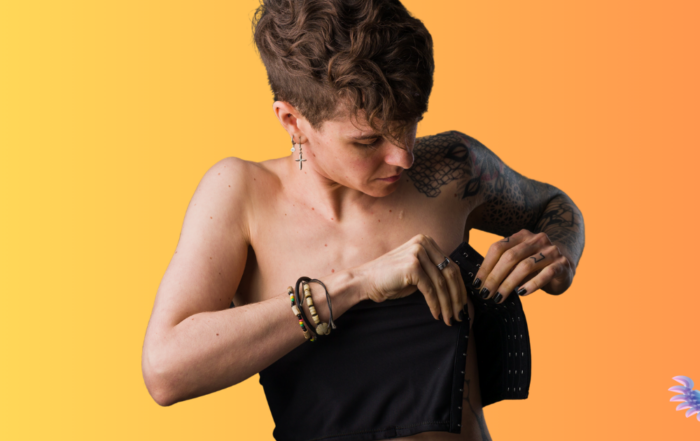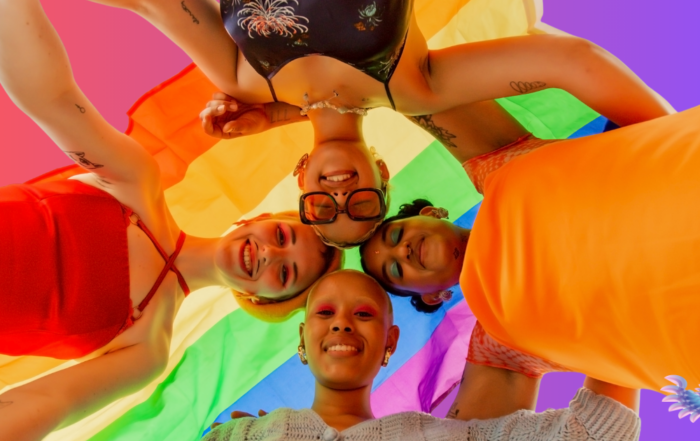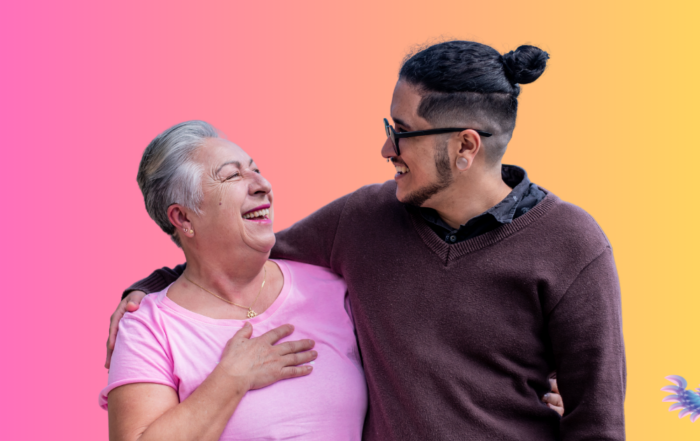Since 2018, on the third Wednesday of each October, we celebrate pronouns day. This is a hot topic, disguised as minor for some but enormous for others. For trans people, it´s about their identity, no less, and for transphobic folk, this is a matter of anger and an excuse to attack us.
Most likely, in the first steps of your family´s Gender Journey, you were confronted with the issue of inclusive language, of which pronouns are part. It was all new to you, and perhaps you even thought, “What´s the big deal about pronouns, anyway?” or questioned if altering the language in that way was right.
This is a tricky one, but I´ll give you the key to understanding it:
It´s not about grammar… this is about people.
Identity matters so much that even wars are fought to preserve identities. When someone identifies you for what you´re not, this can be painful, and the same happens if you behave in ways that depart from your identity, not honoring who you are or what you stand for. For trans persons, this is critical because they start a journey changing everyone´s perceived identity of them to their affirmed one. Everything they´ve been through, ever since they first felt something strange happening and couldn´t make sense out of it, prompted them to question, “Who am I really?”.
A trans person´s struggle, which usually starts many years before parents find out that gender is an issue for them, forces them to finally come to terms with their identity, but then comes the issue of changing how others perceive them, so the struggle is far from over. Just think how exhausted they are when they come out and dare to face a world that is often very hostile.
Pronouns and names reflect a person´s identity and convey a simple but powerful message: I see you. But it goes far beyond that, as you will see. By using the correct pronouns, you´re acknowledging the authenticity of a person´s journey and telling them that you are safe to be around.
The world generally doesn´t understand a trans person´s journey, which is aggravated by misinformation about the genuine reasons people are trans as fodder for political or other purposes, always as a means of gaining power. This is when language plays a vital role; in the same way that inclusive language sends a friendly message, hate language triggers aggression against trans people.
A trans person´s journey to authenticity has many phases, all representing different challenges. The social transition is when a person changes their appearance, name, and pronouns. They often haven´t changed much physically, sometimes just starting their medical transition or maybe not, so people in general often read them as their gender assigned at birth or as trans persons, which makes them vulnerable.
To transition, someone needs to be brave, but that doesn´t mean they don’t get nervous or completely freeze if something threatens them. Being misgendered often triggers all the alarms for a trans person, and immediately, they judge the situation as unsafe. It also can trigger intense dysphoria as it renders their authentic self invisible and makes them aware of the incongruence. Danger or not, the possibility of it makes it impossible for a person to function normally and concentrate. Everyday things for a cisgender person, like using the bathroom, become a matter of intense anxiety for trans persons.
Can you imagine simple things like that becoming the difference between having a normal life and fearing aggression just for using the bathroom? What´s the wrong narrative? Well, they say your kiddo is a perpetrator who wants to use the “wrong” bathroom to rape someone. Sorry if it sounds harsh, but that’s the narrative that a trans person is facing today when the brutal truth is that they only need to pee.
Using the correct pronouns is reassuring and healing. It tells a trans person that there´s no reason to fear and that nothing bad will happen to them on your account. You know how brave they are and that their fight is legit. That you are an ally even if you don´t fully understand what it is to be in their shoes. All that in one pronoun!
And then there´s those people who are language purists telling you that using “they” is incorrect if you´re referring to one person, even if they use it already when they refer to someone whose gender they don’t know. Yes, that´s a correct use of the English language; ther is a singular “they,” but they miss the point…
This isn´t about words at all! This is about a human being who has the right to their identity and is fighting an unequal battle! You´d butcher the language any time if it meant to protect someone!
So, there you go. I recommend that you never engage in a debate about what Shakespeare would say about the use of English (or any language for that matter). Stop them and say: “Oh no, you´re getting it all wrong; this is not about language but a person´s life.” No one cares about some words, but all should care about a human being. Of course, if they´re bigots, they´re probably not ready for that twist… Checkmate!
Since 2018, on the third Wednesday of each October, we celebrate pronouns day. This is a hot topic, disguised as minor for some but enormous for others. For trans people, it´s about their identity, no less, and for transphobic folk, this is a matter of anger and an excuse to attack us.
Most likely, in the first steps of your family´s Gender Journey, you were confronted with the issue of inclusive language, of which pronouns are part. It was all new to you, and perhaps you even thought, “What´s the big deal about pronouns, anyway?” or questioned if altering the language in that way was right.
This is a tricky one, but I´ll give you the key to understanding it:
It´s not about grammar… this is about people.
Identity matters so much that even wars are fought to preserve identities. When someone identifies you for what you´re not, this can be painful, and the same happens if you behave in ways that depart from your identity, not honoring who you are or what you stand for. For trans persons, this is critical because they start a journey changing everyone´s perceived identity of them to their affirmed one. Everything they´ve been through, ever since they first felt something strange happening and couldn´t make sense out of it, prompted them to question, “Who am I really?”.
A trans person´s struggle, which usually starts many years before parents find out that gender is an issue for them, forces them to finally come to terms with their identity, but then comes the issue of changing how others perceive them, so the struggle is far from over. Just think how exhausted they are when they come out and dare to face a world that is often very hostile.
Pronouns and names reflect a person´s identity and convey a simple but powerful message: I see you. But it goes far beyond that, as you will see. By using the correct pronouns, you´re acknowledging the authenticity of a person´s journey and telling them that you are safe to be around.
The world generally doesn´t understand a trans person´s journey, which is aggravated by misinformation about the genuine reasons people are trans as fodder for political or other purposes, always as a means of gaining power. This is when language plays a vital role; in the same way that inclusive language sends a friendly message, hate language triggers aggression against trans people.
A trans person´s journey to authenticity has many phases, all representing different challenges. The social transition is when a person changes their appearance, name, and pronouns. They often haven´t changed much physically, sometimes just starting their medical transition or maybe not, so people in general often read them as their gender assigned at birth or as trans persons, which makes them vulnerable.
To transition, someone needs to be brave, but that doesn´t mean they don’t get nervous or completely freeze if something threatens them. Being misgendered often triggers all the alarms for a trans person, and immediately, they judge the situation as unsafe. It also can trigger intense dysphoria as it renders their authentic self invisible and makes them aware of the incongruence. Danger or not, the possibility of it makes it impossible for a person to function normally and concentrate. Everyday things for a cisgender person, like using the bathroom, become a matter of intense anxiety for trans persons.
Can you imagine simple things like that becoming the difference between having a normal life and fearing aggression just for using the bathroom? What´s the wrong narrative? Well, they say your kiddo is a perpetrator who wants to use the “wrong” bathroom to rape someone. Sorry if it sounds harsh, but that’s the narrative that a trans person is facing today when the brutal truth is that they only need to pee.
Using the correct pronouns is reassuring and healing. It tells a trans person that there´s no reason to fear and that nothing bad will happen to them on your account. You know how brave they are and that their fight is legit. That you are an ally even if you don´t fully understand what it is to be in their shoes. All that in one pronoun!
And then there´s those people who are language purists telling you that using “they” is incorrect if you´re referring to one person, even if they use it already when they refer to someone whose gender they don’t know. Yes, that´s a correct use of the English language; ther is a singular “they,” but they miss the point…
This isn´t about words at all! This is about a human being who has the right to their identity and is fighting an unequal battle! You´d butcher the language any time if it meant to protect someone!
So, there you go. I recommend that you never engage in a debate about what Shakespeare would say about the use of English (or any language for that matter). Stop them and say: “Oh no, you´re getting it all wrong; this is not about language but a person´s life.” No one cares about some words, but all should care about a human being. Of course, if they´re bigots, they´re probably not ready for that twist… Checkmate!







